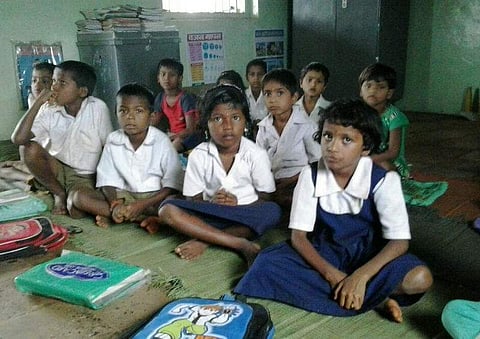

The Andhra Pradesh government is betting big on the National Education Policy (NEP) 2020 to transform school education in particular, through comprehensive academic and administrative reforms, with the key light on improving the learning outcomes.
Various studies in recent years have exposed the "poor reading and comprehension skills" among students while the government has identified many "key concerns" that left the school education system in a not-so-good state.
The growing dropout rate, particularly in higher secondary education (classes 9 and 10), of 14.8 per cent has been a worrying factor, despite implementation of what the government claimed to be "impeccable revolutionary reforms." The dropout rate in the upper-primary level (classes 6-8) is only a marginal 0.3 per cent, according to Government of India data.
The Annual Status of Education Report revealed that in AP only 22.4 per cent children in Class 3 could read the second level textbooks while 38.4 per cent could do subtraction. The report also noted that only 47.60 per cent children in Class 8 could do (mathematical) division, while the percentage is 39.3 per cent in Class 5.
The Student Learning Achievement Survey-2018 noted that students' performance in language decreased from 63.50 to 49.40 per cent from classes IV to IX and in mathematics from 69.55 to 39.30 per cent.
"There is a clear lack of focus on classes 1 and 2 that is leading to a learning deficit. This learning deficit continues throughout the career of the child," a government paper noted.
"One or two secondary grade teachers are handling classes 1 to 5 and they are competing to handle 18 subjects. This is causing inadequate attention on any one class," the note said.
Though the enrolment in government schools showed a significant jump of over 6.2 lakh last year, more than 4.25 lakh children are found to be still 'out of the system' in the state. More than 73 per cent of the total 39,212 primary schools have a low enrolment of less than 60. "Small size schools are spread over the state. This saturation-thin spread of primary schools is resulting in wastage of human resources as well," a senior official of the School Education Department pointed out.
This, he said, was one of the factors contributing to the poor learning outcomes in government schools. Inadequate focus on pre-schooling, sub-optimum utilisation of infrastructure, lack of academic inspections and monitoring and also lack of parental support for learning have been identified as the main causes for the poor learning outcomes.
To stem this, the state government is banking on the NEP 2020 to usher in a transformation and thereby improve the learning outcomes.
Upgrading school infrastructure, restructuring and relocating the existing Anganwadi centres and non-residential schools and strengthening the foundational education are some of the focus areas the government has identified in this regard.
Teachers will also be re-apportioned across schools in accordance with the Right to Education Act to eliminate the disparities and optimize human resources.
"We know what is lacking and we have identified the gaps. We have to now rework our focus and go for a paradigm shift in approach. The NEP 2020 has shown us the path ahead," the senior official said.
The government is now structuring schools and Anganwadi centres into Satellite Foundation School (pre-primary 1 and 2), Foundational School (PP1 and Classes 1, 2), Foundational School Plus (PP1 to Class 5), Pre-High School (Classes 3 to 7-8), High School (Classes 3 to 10) and High School Plus (Classes 3 to 12) in line with the NEP 2020.
One lakh teachers have already been trained to gear up to the changes.
"The endeavour from now will be to make learning holistic, integrated, inclusive, enjoyable and engaging. Special focus will be laid on imparting quality instructions for students of classes 3 to 5 by exclusive subject teachers, which was earlier missing," the Education official added.
Over the next three years, the government has targeted to spend Rs 12,352 crore on refurbishing the school infrastructure, developing laboratories, libraries and playgrounds.
